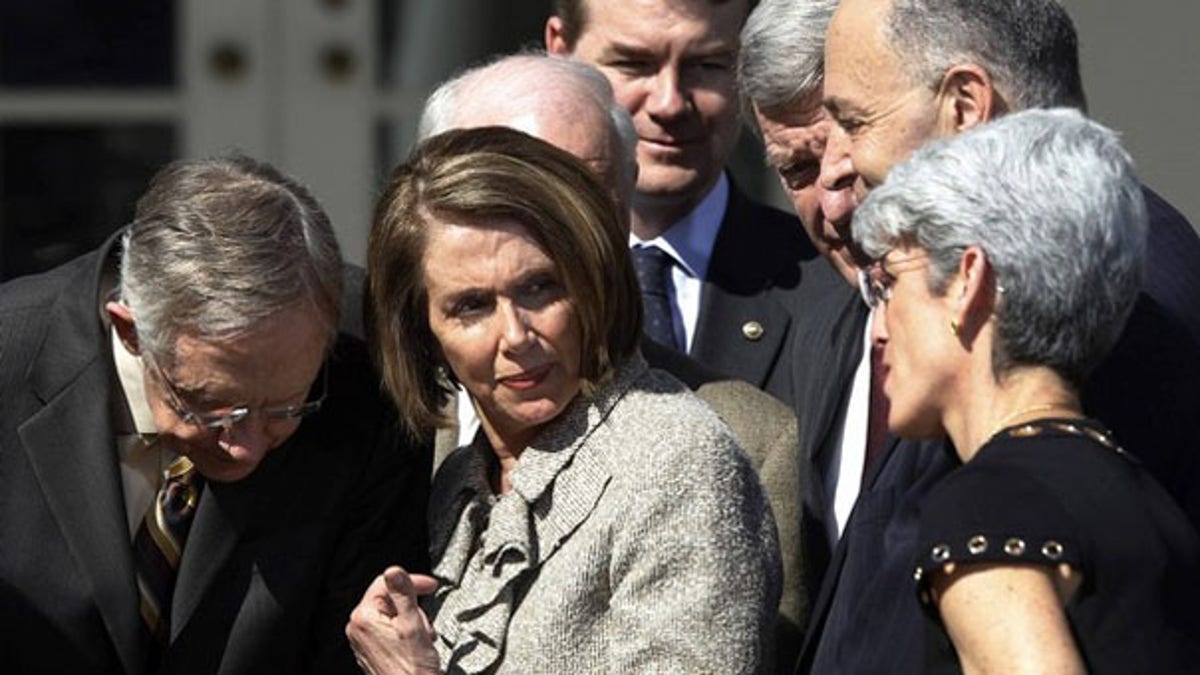
House Speaker Nancy Pelosi confers with Senate Majority Leader Harry Reid and Sen. Chuck Schumer in the Rose Garden March 18. (Reuters Photo)
The proverbial ink had yet to dry on the nation's new health care reform law Tuesday before more than a dozen states filed lawsuits, while others scrambled to put up legislative barricades between themselves and the bill requiring Americans to purchase health insurance or face stiff penalties.
The tactics, employed everywhere from Arizona to Virginia, are the strongest sign that the health care reform fight is far from over.
Florida Attorney General Bill McCollum announced he dropped off his challenge, on behalf of Florida and 12 other states, at the court at 12:02 p.m. ET, minutes after President Obama's signing ceremony to usher in the massive overhaul. Virginia Solicitor General E. Duncan Getchell walked the six blocks from the state attorney general's office in Richmond to the U.S. District Court to file his separate claim that the federal law conflicts with recently passed Virginia law saying no resident shall be required to "maintain or obtain" personal coverage.
In response, the Justice Department issued a statement pledging to "vigorously defend" the constitutionality of the law.
"We are confident that this statute is constitutional and we will prevail when we defend it in court," the statement said.
But the pushback goes beyond the courts. At least 36 state legislatures so far have proposed measures to challenge the constitutionality of the new federal bill, while 29 states are also calling for ballot questions to amend their constitutions and 13 are looking to change state law.
Some states are doing both.
"They're all very different," said Michelle Blackston, spokeswoman for the National Conference of State Legislatures, which is tracking the proposals.
Most states are seeking to prevent their residents from having to follow the new federal requirement to buy health insurance or to pay the coming fines if they don't. Virginia and Idaho already have enacted such laws.
Others are working their way through the legislative process, according to NCSL.
An Arizona proposal to block the so-called "individual mandate" has passed both legislative chambers. A Utah proposal that requires state permission to enact provisions of the federal law has also passed both chambers; a similar measure to Virginian and Idaho has passed one chamber in Tennessee and Georgia; and resolutions on state constitutional amendments have advanced in Florida and Missouri.
Click here to see a list of state legislative actions.
Some of the actions taken require a simple majority while others require two-thirds approval for passage, meaning an overwhelming portion of state lawmakers would have to object to the federal plan.
One problem facing all the state proposals is that federal law generally trumps state law.
Constitutional experts say this means, until a court decision comes along to back them up, the state legislatures' action are mostly symbolic.
But citizen challenges are expected, and at least a dozen state attorneys general have announced their intention to file lawsuits challenging the bill.
Jonathan Turley, law professor at George Washington University, said the interplay between the court cases and the state proposals is key.
He said the state laws prohibiting the mandate from being enforced may not actually stop residents from being fined for not purchasing insurance in the near-term, but they could strengthen the court cases of those challenging the health care bill.
And, in turn, the states may rely on a high-level court decision to be able to exert their independence.
"Ultimately, I think the courts are going to have to resolve this," he said.
Turley said the myriad legal challenges will probably be consolidated and reach the appeals court level, if not the Supreme Court.
"I think the justices would certainly give this a close read for possible review," Turley said.




